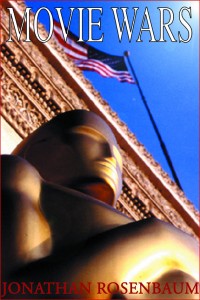Some Vagaries of Distribution and Exhibition
Chapter Two of my book Movie Wars: How Hollywood and the Media Limit What Films We Can See (Chicago: A Cappella Books, 2000). The cover below is that of the U.K. edition published by the Wallflower Press. — J.R.
How often are aesthetic agendas determined by business agendas? This question is not raised often enough.Terminology plays an important role here. For example, once upon a time, previews of new releases were called “sneak previews” because the titles of these pictures weren’t announced in advance. Most industry people continue to use the term, despite the fact that the titles are announced and even advertised, so that the original meaning gets obfuscated: the only thing “sneaky” is the fact that they’re called “sneak previews.”This is a relatively trivial example of how terminology alienates us from what goes on in the world of movies. A more significant example is how we use an extremely loaded term like “independent.” An independent filmmaker traditionally meant a filmmaker who worked independently, free from the pressures of the major studios. If you believe what the media say about independent films, then the mecca for independent filmmaking would be the Sundance Film Festival, an event where independent films and filmmakers congregate annually. Read more


